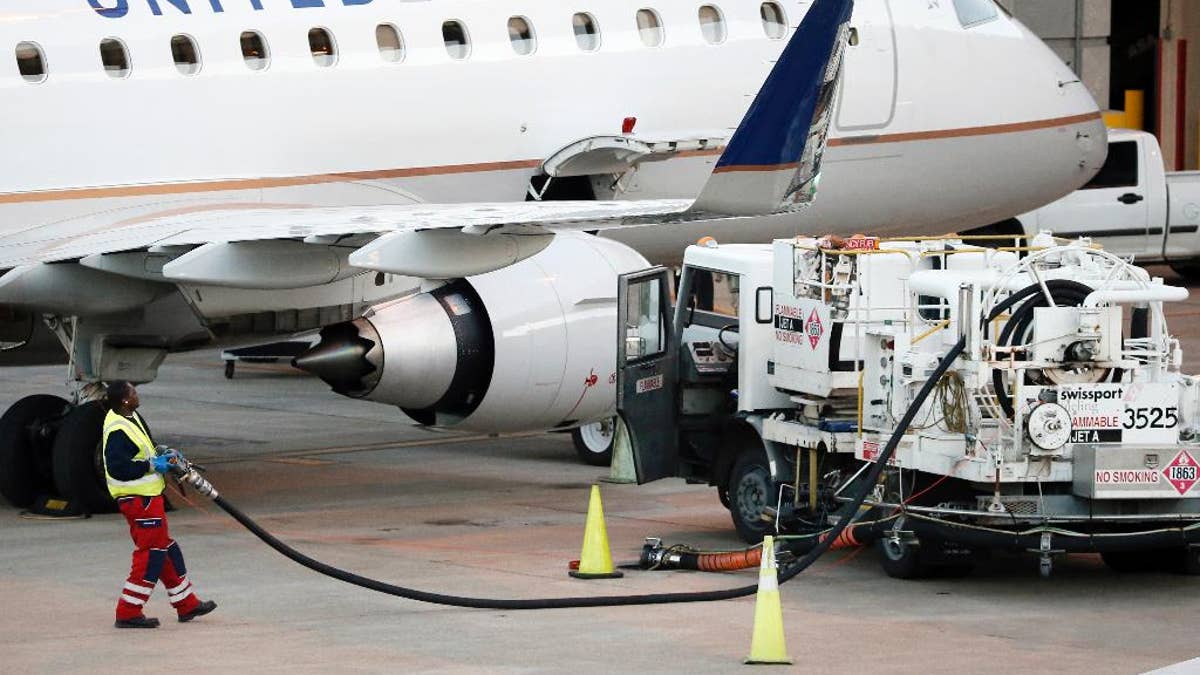
Jan. 15, 2015: A worker prepares to fuel a United Express aircraft after it arrived at Dallas-Fort Worth International Airport. Many of the incidents in the memo were direct results due to pilots and crew not speaking up in the event of an unsafe situation. (The Associated Press)
"In some cases, a pilot’s input is ignored. This is unacceptable."
In the wake of several inflight "near-misses", United Airlines has issued a stern warning to staff urging pilots to be more vigilant on duty, the airline confirmed Wednesday.
“Over the past few weeks, our airline has experienced what we would categorize as major safety events and near-misses,” reads the memo first obtained by ABC News. Though no fatalities have occurred, United staff have confirmed the tone of the memo was intended to "get pilots' attention."
First released to pilots Jan. 9, the warning from Howard Attarian, senior vice president of flight operations, and Michael Quiello, vice president corporate safety, details four recent “safety events and near-misses,” including two incidents where planes were flying too low --and where one even triggered a warning alarm that required an emergency pull-up maneuver.
"We are open and direct with our pilots, as we are with all of our employees," United spokesman Charlie Hobart said in a statement. "The language that we used is strong, and that's because safety is our top priority. This enables us to recognize potential issues and adjust our actions to ensure the safety of customers."
In addition to being preventable, many of the incidents were due to the lack of “attention to disciplined Crew Resource Management,” meaning that both pilots and crew are at fault for not speaking up in the event of an unsafe situation, the memo says. Quiello and Attarian cite recent pilot movement—i.e. retirement and new hires—as part of the issue concerning the safety breaches.
According to Reuters, United’s most recent fatal crash occurred in 2009—under Continental before the two airlines merged in 2010. But Hobart says the pilots involved in that incident were employed by regional operator Colgan Air. The last fatal United incident occurred in 1991.
The full memo is detailed below.
Date: January 9, 2015
SAFETY ALERT: Significant safety concerns
Recent events in our operation have dictated that we communicate with all of you immediately. Over the past few weeks, our airline has experienced what we would categorize as major safety events and near-misses.
In Flight Operations we have seen two events in close proximity to terrain (one resulting in a GPWS pull-up maneuver), an Undesired Aircraft State on departure and a low fuel state on arrival after a deviation from a Sabre Flight Plan routing.
The common thread with all of these is that they are preventable. We must ask ourselves, “Do we have our priorities in line every time we put on our uniforms and strap into the airplane?” While the airline industry always seems to be in a state of flux, the one constant for all of us is that we are professional aviators with the common goal of flying our passengers and crew from point A to point B SAFELY.
Another common thread to some of these events is a lack of attention to disciplined Crew Resource Management. Every time we enter the cockpit with the intention of performing our pilot duties, we evaluate risk. Every pilot must be willing to speak up if safety is in question. In the same vein, every pilot must also accept the input of their fellow crewmembers on the flight deck. In most cases, one of the pilots recognizes an unsafe situation. In some cases, a pilot’s input is ignored.
This is unacceptable.
The recent CFIT accident in Birmingham involving another carrier underscores how quickly things can unravel. The approach and landing appeared normal to the pilots until right before impact. Let’s not for a moment think something like that could not happen at United.
We are currently seeing a lot of movement in the pilot group, such as retirements, seat movements and new hires, that -- while welcome -- introduces significant risk to the operation. While no one ever shows up to work with the goal of intentionally making a mistake, we are human and mistakes happen. What we can control is how we conduct ourselves on each and every flight. If you have ever used the term “Standard Brief” before departure, you have not complied with an SOP. If you have ever exceeded Stabilized Approach Criteria intentionally and not executed a go-around, you are not in compliance.
We know this is a brutally honest message and the tendency may be to rationalize why compliance is not occurring in some areas. Bottom line: United is at a critical juncture in its history and we as aviators must adhere to the policies and procedures outlined in the Flight Manuals, FOM, WOM and ALPA Code of Ethics. Reviewing, understanding, and complying with the guidance in company manuals is imperative to returning ourselves, our fellow crewmembers and passengers to their families safely. This is our top priority and greatest responsibility, and we appreciate in advance your continued commitment and cooperation.
Fly safe.
Howard Attarian, Sr. Vice President Flight Operations
Michael Quiello, Vice President Corporate Safety
